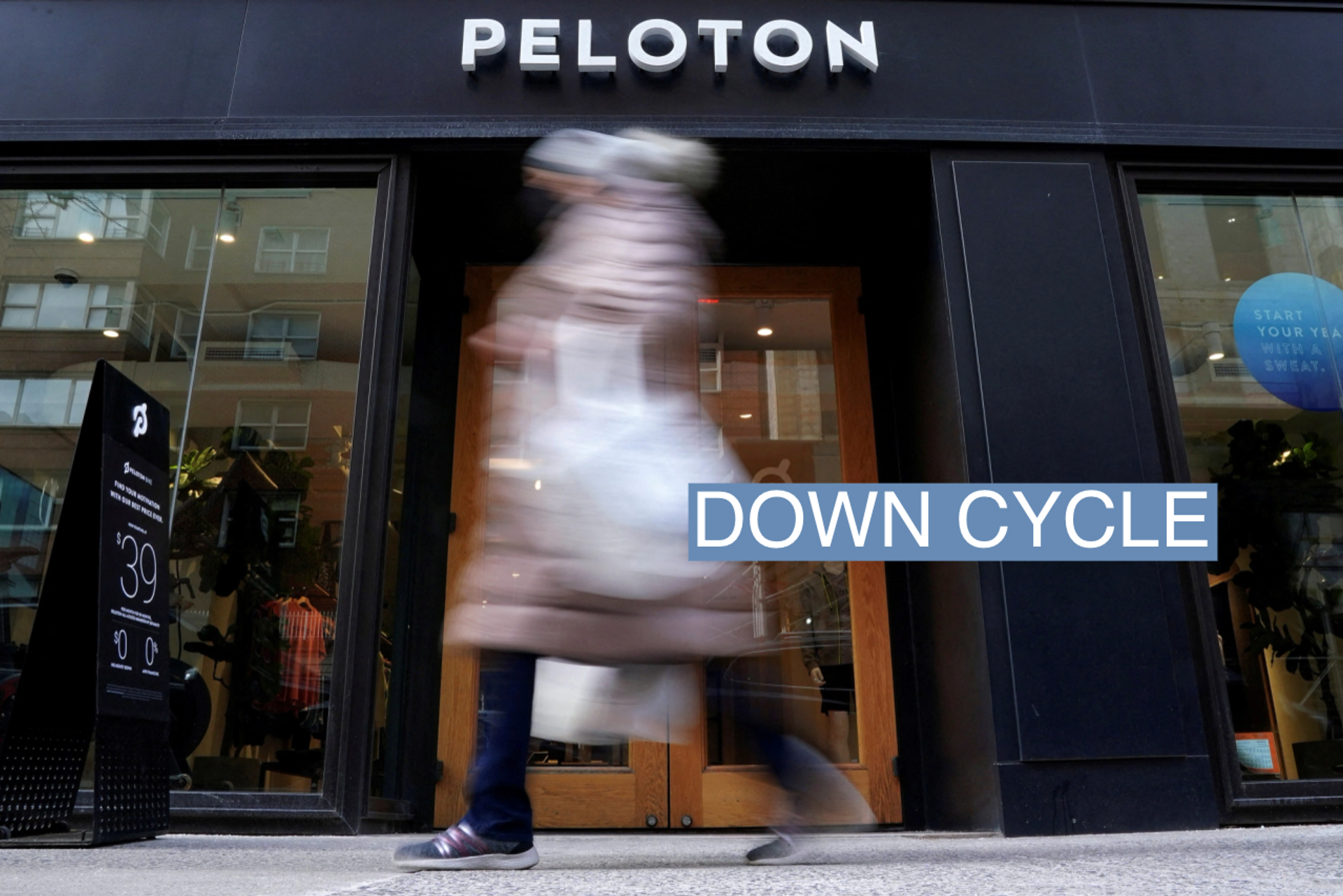Q&A

Howard Morgan co-founded Renaissance Technologies in 1982, an era of high inflation and global supply shocks. Now he’s a venture capitalist, chair of B Capital. He’s traded and invested through just about every market imaginable, and I wanted to see what he makes of what’s going on today.
Q: What on earth is happening right now?
A: All of a sudden, the risk-free rate is not zero anymore. So the money doesn’t have to go to risky assets. You can get 4.5% on your cash right now [in Treasury bonds]. You don’t have to keep it all in the markets, if you think they might continue to go down this year, which I do.
Q: Where do rates land, and what does that mean for companies and investors?
A: I think 5%. The Fed may pop it up a little bit higher for a while, but I think it’ll come back down. That means companies have to learn how to do business when money isn’t free. In the venture world, that means companies have to get to cash-positive sooner.
And companies like Robinhood are going to have some trouble. We saw it in past booms — day-trading in the 90s, and to some degree in 2006 and 2007, when everyone was buying houses and flipping them. Sure, it’s great fun when you’re making money in GameStop, but when it stops, people say, “well, I really can’t afford to gamble.” So the market will be back to lower volume and lower volatility.

Q: A lot of successful startups are founded in recessions. I’m thinking of Uber, Airbnb, and others that came out of 2008. Some of that is available talent, but a big piece is low interest rates, which push investors into riskier bets. That’s not the case with whatever downturn we’re in right now. What do you think?
A: You’re right that downturns usually come with low interest rates, which helps [with fundraising]. But what’s happened today versus 2000 or 2008 is the cost of starting a company has gone to zero. You want space, there’s WeWork. You’re not going to buy servers, you’re going to rent on the cloud. You don’t need as much capital to get going, so the interest rate environment won’t hurt you nearly as much as it would have in 2000 or 2008.
Q: You sound pretty optimistic for this crop.
A: People are available that wouldn’t have been available otherwise, because the big companies are letting them go. And they’ve already learned all these skills. Those are things that founders in the ’90s didn’t have. They didn’t know how to scale companies, and they didn’t have the ability to do it cheaply.
The other thing that’s happened is the power of the iPhone and the app stores means that you have this worldwide distribution on day one. It’s expensive — Apple’s taking their tax, for sure — but for what you get, it’s a game changer.
Q: OK, the wind’s at their backs, but it seems like what investors are expecting from startups has changed.
A: When I came into the industry, I met Fred Adler, a legend in the industry. He had a sign above his desk that said “happiness is positive cash flow.”
We got away from that, first in the ’99 bubble, when happiness was lots of eyeballs. And then again in 2017, 18, 19, when people were just going for growth. Investors have now gone back and said no, we’re happy to slow the growth in order to make it profitable growth. We’re willing to wait a little longer for a company to dominate an industry
There’s still a lot of money sitting on the sidelines, but it’s going to make sure the companies firms have already invested in are shored up. We told our [portfolio companies], make sure you have 24 months of capital and a plan to get to cash-flow positive, or as close as you can, on that money.
Q: For a while, a lot of the venture money and certainly a lot of the attention went to buzzy, direct-to-consumer names — Peloton, HelloFresh, etc. That group has obviously not done well, and all the money has been made on the enterprise side.
A: That’s why our focus is almost entirely B2B, [business to business]. Consumer companies are in a constant race to keep up. If you’re a fashion company every year is different. Peloton creates a brand new marketplace and gets valued like a tech company and then people realize the technology actually isn’t unique and it’s actually just a maker of bikes, and not especially good at it.
We have this company, Icertis, which does contract management. Think about Microsoft’s cloud business. If service is down for two hours, one customer gets a rebate of x. If it’s down for six hours, another customer gets a rebate of y. They have no easy way to look at all their contracts and figure out who they owe what. It’s grown into a mega unicorn by solving a real, but completely unsexy problem.

Q: I feel like a lot of people get into venture capital because they want to hang out on Sand Hill Road and invest in fun things that everybody’s heard of. But actually the people who make money do incredibly boring things really well?
A: Yes, or do something that’s very focused on a particular understanding of a particular market. Our first investment at B Capital was Ninja Van, a last-mile delivery service in in Asia. When you get a delivery from FedEx, you get an email from donotreply@fedex.com that says here’s your tracking number. Ninja Van sends you a Whatsapp that says, we have a package to deliver to you tomorrow afternoon, how should we do it? And people come back with things like go to the left, leave it at the yellow door, but not before four o’clock or my neighbor will steal it. They have a 95-plus percent success rate on their first attempt.
The other problem is, if you’re FedEx in the U.S. and you have six new iPhones going to one building, you want to make sure that’s with one driver so it’s efficient. In Asia, you might not want one driver to have that much value on their motorbike, because you might not see them again. So you make sure that goes with six different drivers. You’re solving for different things in local markets.
Q: Putting your hedge-fund hat back on, the people running trading desks right now have never really seen inflation. That’s a big blind spot.
A: The people who’ve joined [Wall Street] since 2012 have only seen things go straight up. They’ve only seen one set of patterns. And now they’ve been hit in the face with this market.
And the quant traders who started in the last couple of years, maybe they bought 10 years worth of data to back-test their models. It’s very skewed towards up markets. Think about a firm like Renaissance, which has literally 50 years of tick-by-tick data. They can simulate and back test on environments that are more like today.
Q: You co-founded Renaissance, one of the biggest quant funds on Wall Street. Lower volatility is bad news for firms like it.
A: The quants are the house in a casino and the more players that come to the casino, the better they do. So if volatility drops and market interest drops, the quants don’t do as well. Or at least all of the profits go to a couple of firms.
Q: Anything top of mind for you that we didn’t talk about?
A: Well, crypto.
Q: Let’s do it.
A: The complete lack of oversight and the complete lack of diligence by some of the major firms is disheartening. A firm as great as Sequoia is — and it is a great firm — just falling down on the job like that.
But it’s not going to take the industry all the way down. And I’m still a believer in the blockchain. I think people will be surprised over the next 18 months at how the crypto industry comes back. You pick over what’s there and rebuild stronger.
That’s the thing about investment bubbles. It’s happened with the railroad industry, the railroads all went bankrupt, but the track that was laid powered the industrial age. Same with fiber-optic cable in the dot-com era.
Q: Are people still willing to fund crypto companies?
A: At much lower prices, and more cautiously, but yes. What will help is the growth of the metaverse if Apple makes the announcements they’re supposed to make in [augmented reality] and [virtual reality], and Meta does what it’s been promising.
Q: Are you going to spend $3,000 on the Apple goggles?
A: I buy everything. I’m a gadget guy, and have been since I got my first ham radio when I was 10. I bought a Google Glass!
Q: Obligatory question on ChatGPT…
A: I don’t know anyone who hasn’t spent 10 hours on ChatGPT in the last couple weeks. A great bet for Microsoft. Satya [Nadella] is determined not to not to lose on AI the way they did in cell phones.